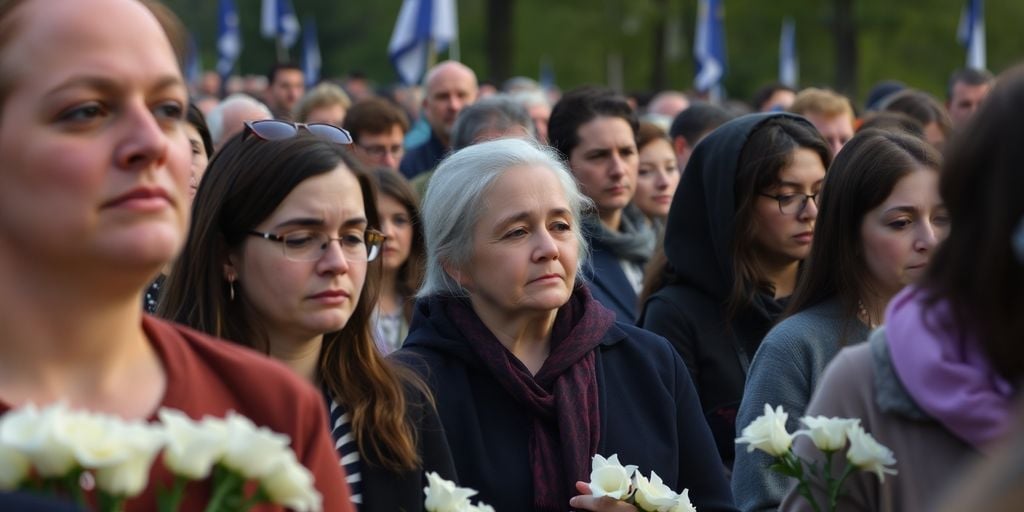Bosnia Marks Three Decades Since Srebrenica Genocide Amidst War Criminal’s Denied Release
Bosnia and Herzegovina is commemorating the 30th anniversary of the Srebrenica genocide, a horrific event where over 8,000 Bosniak Muslim men and boys were systematically murdered by Bosnian Serb forces. The solemn occasion is marked by remembrance ceremonies and the burial of newly identified victims. Concurrently, a significant legal development has occurred, with the UN court denying early release to a prominent war criminal associated with the atrocities.
Key Takeaways
- Bosnia and Herzegovina is observing the 30th anniversary of the Srebrenica genocide, a massacre of over 8,000 Bosniak Muslim men and boys in 1995.
- Newly identified victims are being laid to rest, highlighting the ongoing process of identifying remains from mass graves.
- The UN court has denied the early release request of a convicted war criminal involved in the genocide.
- The anniversary is marked by international dignitaries and a focus on remembrance, justice, and preventing future atrocities.
- Discussions around historical revisionism and the differing narratives taught in Bosnian schools persist.
A Nation Remembers and Reflects
Thousands gathered in Srebrenica to commemorate the 30th anniversary of the genocide, an event acknowledged by international courts as Europe’s worst atrocity since World War II. The ceremonies included the burial of seven newly identified victims, underscoring the enduring pain and the ongoing efforts to bring closure to families who are still uncovering the remains of their loved ones. Many families are burying partial remains, a stark reminder of the brutality and the attempts to conceal the crimes.
International Condemnation and Calls for Justice
International officials, including the Dutch Foreign Minister, attended the commemorations, acknowledging the failure of the international community to prevent the genocide. Speakers emphasized the importance of remembrance and the need to fight against hatred and injustice. Mothers of Srebrenica survivors highlighted the ongoing suffering in other conflict zones, drawing parallels to the horrors of 1995. The UN General Assembly has officially designated July 11th as the International Day of Remembrance for the Srebrenica Genocide.
Legal Developments and Historical Narratives
In a significant development, the UN court denied the request for early release by a convicted war criminal, underscoring the pursuit of justice for the victims. Meanwhile, the anniversary also brings to the forefront the ongoing challenges of historical revisionism in Bosnia and Herzegovina. Differing narratives about the war are taught in schools across the country, creating a complex landscape of memory and understanding. Efforts are underway by organizations to promote a unified historical account based on court-established facts, but challenges remain in implementing these across all educational institutions.
The Enduring Impact of Genocide
Thirty years on, the Srebrenica genocide continues to cast a long shadow over Bosnia and Herzegovina. Survivors and their families live with the deep wounds of the past, while the nation grapples with reconciliation and the prevention of future atrocities. The commemorations serve as a powerful reminder of the human cost of ethnic conflict and the critical importance of acknowledging truth and pursuing justice.
Sources
- For survivors of the Bosnian genocide, the war has never ended, Salon.com.
- Why Duchess Sophie Left her Scarf at Heartbreaking Memorial in Bosnia and Herzegovina, Marie Claire.
- Srebrenica, 30 Years Later: The Battle for Memory in Bosnia-Herzegovina, New Lines Magazine.
- Thirty years after the Srebrenica genocide, Bosnia and Herzegovina remains a land suspended between memory
and oblivion, New Eastern Europe. - Thousands gather in Srebrenica on 30th anniversary of Europe’s only acknowledged genocide since WWII, PBS.






